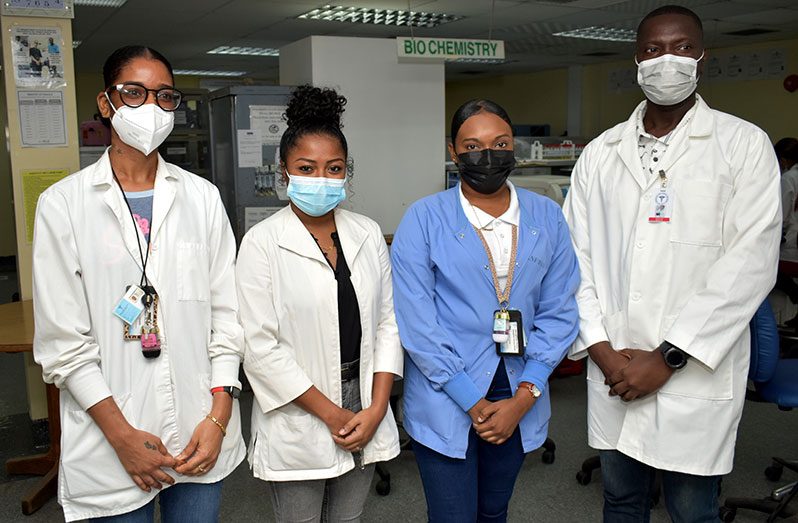PHLEBOTOMISTS at the Georgetown Public Hospital were celebrated on Friday in keeping with the International Phlebotomist Recognition Week which ran from February 14 to 18.
During a small recognition ceremony at one of the hospital’s laboratories, phlebotomists who have been working at the facility for quite some time shared their experiences in the profession.
Phlebotomy technicians or phlebotomists collect blood from persons and prepare the samples for testing. GPHC Public Relations Officer, Jai Lall told a small gathering that during the week, the hard work of phlebotomists should be recognised within the hospital, along with others around the world.
Seon Maynard, who has been working at the hospital in the position for approximately five years, told members of the media that phlebotomists can sometimes be considered the face of the rooms.
Patients passing through the hospital facility at some point visit the Phlebotomy Department.
Another Phlebotomist, Carmelita Corlette related that her experience working in the field has been great and her favourite part happens to be interacting with patients.
“Sometimes a patient comes in with a bad day and I may say something and they will let me know, ‘oh you made my day’,” she said. Corlette noted that patients sometimes make her day during their visits.
Giving a brief run down of the duties of phlebotomists, Kimberly Baldeo said on a day-to-day basis they would collect samples form patients and receive samples when they come from the various wards. These samples include blood samples, urine samples and more.
“There’s a lot of patients we deal with on a daily basis… since we worked here so long, we picked up the pace working so we work as fast as possible and as safely as possible,” she expressed.
As it relates to how they work, she told members of the press that they usually prioritise patients who are physically challenged, children and pregnant women. Some of the tests that are done for emergency purposes can take a shorter time than usual tests. However, those done overseas can take days to return.
While all of the phlebotomists who spoke to the media on Friday expressed that they enjoy what they do and the possible advancement of their careers in the medical field, they all admitted that there are certain risks involved with the profession.
Kimesha Hyman, Baldeo, Corlette and Maynard indicated that they had to undergo some level of precise and strategic training before they were equipped to take up the profession. Even with the ongoing global pandemic, they all noted that not much has changed as they previously would have had to be dressed in personal protective gear prior to the pandemic.
Maynard revealed that since the pandemic, they have stepped up the sanitisation and precautions that are taken when they are interacting with patients at the facility.



.jpg)










